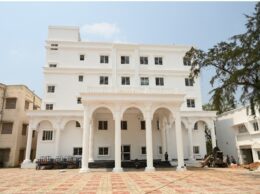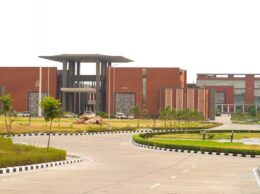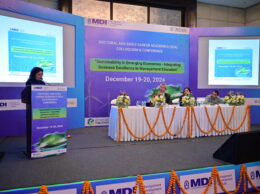CHANDIGARH, India, — To recognize and felicitate educationalists for their commendable contribution in the implementation of National Education Policy, 2020 (NEP), the Indian School Awards (ISA) were honoured to as many as 179 educationalists from across India on 22 December (Friday) at the campus of Chandigarh University, Gharuan (Mohali).
Lieutenant General Kanwal Jeet Singh Dhillon, PVSM, UYSM, YSM, VSM retired General Officer (Indian Army), presided over the Awards ceremony as the Chief Guest, while Vivek Atray, Former IAS, Motivational Speaker and Author, was the Guest of Honour. Lt. Col. Umang Kohli (Retd.), Veteran, Executive Editor India Strategic; Prof. (Dr.) R.S. Bawa, Pro Chancellor Chandigarh University; Akshay Ahuja, Co-Founder Robochamps and Curator of ISA Events; Prof. (Dr.) Manpreet Singh Manna, CU Vice Chancellor; Prof. (Dr.) Sanjeet Singh, CU Pro Vice Chancellor were also present on the occasion.
Other eminent guests present on the occasion included Sagar Bishnoi, Associate, United Nations Development Program; Kritika Seth, Principal, BCM Arya School, Dr. Rita Vats, Founder and Director, Well Being Special School; Kritika Kaushal; Anandhapadmanabhan, Researcher, Sandepani School Trivandrum; Virat Kumar, Regional Office Manager – Avicenna International College (AIC) South Asia Office; Khalid Samadi, Chief Administrative Officer, Jaipuria Institute of Management, Lucknow; Anirudhh Gupta, Director, DCM Group of Schools; Kavita Das, Principal, St. John’s High School Chandigarh; Neha Kashyap, Principal, R Rudra International School; Ritu Arora, Principal, Mount Olympus Juniors Gurugram; and Kanika Kaushik, Owner Kaushik Public School.
As many as 890 applications were received from 18 States and Union Territories for the prestigious Indian School Awards, of which 179 awardees were selected across 61 categories. Held annually, Indian School Awards is a platform to recognize and celebrate the efforts, contributions, and achievements of schools, principals, teachers, and counsellors across the country in the field of education.
During the awards, panel discussions were held on the Role of EdTech in Revolutionizing Indian Schools and National Education Policies Impact on Indian Schools. Additionally, essential sessions were conducted on topics like ‘Innovations in Education: Navigating the Digital Age’ and ‘Empowering Students for Tomorrow’s World.’
Chief Guest, Lieutenant General Kanwal Jeet Singh Dhillon, in his address, stressed on the importance of selection and maintenance of aim to achieve success, quoting Guru Gobind Singh Ji’s words ‘Nishchay kar apni jeet karo’. Emphasizing on the role of the teachers and educators in shaping the future of the students, he said, “As a teacher and mentor, it is your responsibility to clarify any confusion in the minds of students, helping them set their goals clearly, since you are the best guide for them, especially for those who do not have a background to receive good advice. Only teachers can provide guidance to the students across various fields, and education’s powerful influence can steer students away from wrong paths, such as involvement in terrorism.”
He added, “Teaching is a noble profession, endowed with the ability to shape a mediocre child into a future leader. Even the implementation of the National Education Policy (NEP) aims to make education system flexible and enhance its standards. Hereby, I assert that 100% of the children will serve as India’s workforce for the next 40 years and drive nation’s progress. However, today’s youth is burdened with information and confusion, and needs to be guided. It is imperative to develop a structured system where principal and the teachers can set goals and provide guidance to the students.”
The Guest of Honor, Vivek Atray, while addressing the gathering, emphasized that a teacher’s ability to lead is what matters, regardless of the subject they teach. He said, “India’s tomorrow requires not just leaders but role models, who can be from any field and teachers have embraced the responsibility of nurturing the country’s future. Since children observe and emulate our actions more than our words, teachers must strive to be exceptional leaders and serve as role models for them.” He urged the educationists to – regardless of the circumstances – strive to be exemplary role models for the society.
Mr. Atray further emphasized the need for maintaining a broader perspective in today’s fast-paced era. Quoting ‘Beware the barrenness of a busy life’, he said, “Nothing is achieved from busy life, but it only leaves one uncertain about your accomplishments. Turmoil is a part of life, but successful leaders are those who are able to handle the burdens. Their burdens are not minimized, their shoulders are broader, encompassing the challenges of mind, heart and soul. Only by raising the consciousness and maintaining a broad perspective, one can find solutions to problems.”
Prof. (Dr.) R.S. Bawa, Pro Chancellor Chandigarh University, while expressing his perspective on school leadership, said, “The role of a school principal involves greater responsibility compared to a corporate or organizational leader. A school principal must possess a vision for the school, serve as a leader for colleagues, and guide students. However, introducing complex concepts like AI and its global applications to teachers and students can be particularly challenging for those lacking technology knowledge themselves. So, whether in a school or any educational institution, it’s crucial for the leader to ensure continuous faculty upskilling, which becomes even more important in terms of technology.”
Prof. Bawa emphasized the importance of fostering intelligence quotient, emotional quotient, and physical quotient in school-aged children. “It is imperative to nurture curiosity in children. Success is more likely when a child is both curious and has a career goal. It is essential to ensure that exposure to technology is not solely detrimental. Instead, we should pursue technology with innovation and flexibility,” he added.
Dr Rita Vats, Founder and Director, Well Being Special School underlined the need of student-centric approach in schools and involving students in the decision-making as it makes ‘a positive impact on their self-esteem and participation’.
Kritika Seth, Principal, BCM Arya School, emphasizing on the importance of new initiatives in order to nurture innovation and fostering creative thinking in students in order to help them learn more effectively.
Anandhapadmanabhan, Researcher, Innovative Research Wing, Sandepani School, Trivandrum, highlighted the significant potential of educational technology (EdTech) to democratize the classrooms, marking a shift from the traditional model where students primarily received information from their teachers. “It is essential to integrate a technology-oriented course into the educational curriculum,” he said.
Virat Kumar, Regional Office Manager, Avicenna International College, South Asia Office, said, “EdTech has replaced traditional blackboards with smart whiteboards, benefiting every child. This shift has allowed students to achieve more through self-learning, utilizing EdTech and technology. With the help of EdTech, even small schools in smaller cities are thriving, contributing to an improvement in the gross enrolment ratio.”
Prof. (Dr) Manpreet Singh Manna, Vice Chancellor, Chandigarh University said, “Its universally acknowledged that the curiosity level among today’s youth is remarkably high which has led to a significant surge in technology, tools, and skills.”
Kavita Das, Principal at St. John’s High School, Chandigarh, said today’s children are likely to pursue careers that don’t exist at present so it’s crucial to cultivate a flexible mindset that encourages exploration and creativity in youth.
Prof. (Dr.) Sanjeet Singh, Pro Vice Chancellor, Chandigarh University, expressed strong support towards the concept of Startups in India, terming them as ‘Aii’ as they are accessible, interactive and innovative. He said, “Chandigarh University operates an incubator within the campus having numerous startups, many of which are engaged in the EdTech sector. And the EdTechs are going to boom very soon as they stand out by actively engaging with schools –interacting with both students and teachers – striving to build personalized systems utilizing psychometric tools to tailor the learning experiences based on individual needs of the students.”









